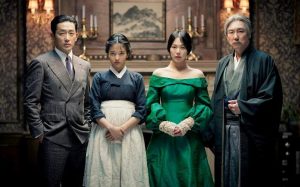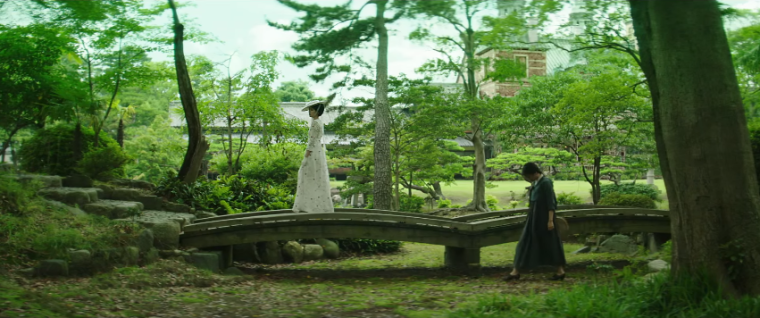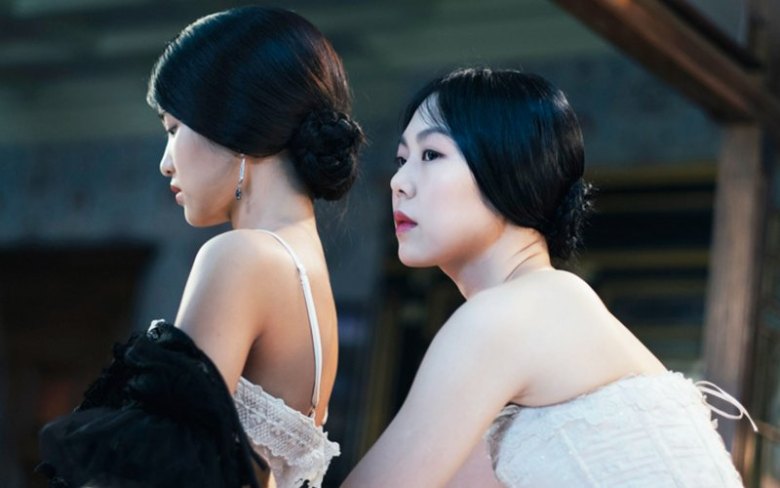If you don’t yet know who Park Chan-wook is, go look him up. Right now. Go ahead, it’s okay, I’ll wait… Did you? Great. Then you know he’s a film director, screenwriter, and producer. You saw his list of films, right? Did you see the list of awards he’s won? That’s right. He won Best Film on only his third ever directing project at the Deauville Asian Film Festival.
He’s won awards at Film Festivals literally around the world, from Seattle to Bergen, Sarasota to Bangkok, Montreal, Venice, Berlin, Japan, and South Korea, and of course, Cannes — where he won the Grand Prix for 2003’s Oldboy, the Jury Prize for 2009’s Thirst, and where The Handmaiden was nominated for both the Queer Palm and the Palme d’Or award, the highest honor of the eminent French film festival.
The Handmaiden is Park’s latest endeavor, released in South Korea this summer, and in the rest of the world this fall, and it resolutely continues to show the quality and effort he puts into all his works.
The Handmaiden began with a book. A novel by Welsh author Sarah Waters, titled Fingersmith. It was adapted for the screen by Chung Seo-kyung, who has worked with Park Chan-wook on three of his previous films: Thirst, Lady Vengeance, and I’m a Cyborg, But That’s Ok. Like many of Park’s films, it is a very focused film where the bulk of the action is centered around only a handful of characters and, in the case of The Handmaiden, the director made the very interesting choice to pair famous national actors with a complete unknown to create the foursome at the heart of the plot.
Kim Min-hee, who plays Lady Hideko, is an award-winning Best Actress with a long list of projects under her belt. In the film’s press conference, Park called her “the most coveted A-list actress at the moment”. On the other hand, Kim Tae-ri, who Park chose to act alongside Kim, has only ever appeared in short films before, and only a handful at that. She was cast from a group of 1,500 competitors.
 The male actors who make up the remainder of the main cast are Cho Jin-woong (Uncle Kouzuki) and Ha Jung-woo (Count Fujiwara) who both come from a long line of detective dramas, gangster films, and sageuks. Interestingly, they’ve already acted alongside each other in Nameless Gangster: Rules of the Time, Kundo: Age of the Rampant, and Chronicle of a Blood Merchant (which Ha also directed). These two solid, experienced actors provide the background on which the famous Kim Min-hee and the unknown Kim Tae-ri build their mystery.
The male actors who make up the remainder of the main cast are Cho Jin-woong (Uncle Kouzuki) and Ha Jung-woo (Count Fujiwara) who both come from a long line of detective dramas, gangster films, and sageuks. Interestingly, they’ve already acted alongside each other in Nameless Gangster: Rules of the Time, Kundo: Age of the Rampant, and Chronicle of a Blood Merchant (which Ha also directed). These two solid, experienced actors provide the background on which the famous Kim Min-hee and the unknown Kim Tae-ri build their mystery.
The film is classified as an erotic psychological thriller. It is, however, less of a thriller than some of Park’s previous works, and even still less of a thriller than the original book version. In fact, I was surprised by how it was almost completely turned into a romance, with a side of mystery. There is, of course, the old adage (which I normally agree with 100%) that the book did it better. In the case of The Handmaiden and Fingersmith, I think they are even, because realistically they are two completely different stories in the hands of two different masters of their crafts.
Warning: the following contains spoilers for the film and the novel it is based on. We kindly ask that readers use spoiler tags when discussing these in the comments.

The premise of both stories is the same: a strange gentleman hires a petty thief to pose as a maid and help him con an unsuspecting heiress out of her fortune, through elopement and the eventual committing of said heiress to an insane asylum. However, the maid is the one who ends up getting duped when the mysterious heiress turns out to have been in on it all along.
This is where the plot diverges. And yet, the film is still very much influenced by the original work. Where the book was set in Victorian England, the director chose the similar class structure of Korea under Japanese colonial rule. When the heiress’ backstory is revealed in the film, it is with a similar feeling of dread and fascination as that of the book that we learn of her uncle’s abuse and the strange secluded life she has been living.
 Still, the team of director and screenwriter for The Handmaiden make a few changes to the essence of the story. Some are small — like the focus on the foursome of characters, two male, two female, that make up the circle of betrayal. In Fingersmith, there is a whole other level of plot beyond that of the manor house. However, this is left out of the film almost entirely.
Still, the team of director and screenwriter for The Handmaiden make a few changes to the essence of the story. Some are small — like the focus on the foursome of characters, two male, two female, that make up the circle of betrayal. In Fingersmith, there is a whole other level of plot beyond that of the manor house. However, this is left out of the film almost entirely.
Other changes were drastically huge — most notably the emphasis on the romantic relationship between the lady and her maid. A holdover from the novel is the slow build of the feelings between the two women, and being able to watch Kim Min-hee and Kim Tae-ri act out their slow, naive realization is spectacular. However, I was still surprised by how far Park took the romantic aspect.
It is not unrealistic, far from it; in Park’s hands, and those of screenwriter Chung and the two female leads, the women’s budding relationship becomes a thing of pure artistic beauty. The ebb and flow of their attentions, the way they are always subtly watching each other (helpfully shown through both of their points of view), the mutual jealousy over their individual interactions with the Count, and ultimately the way they stand up for each other. All are so subtly emphasized that by the time we realize what is happening, it just makes perfect sense.

Here is where I address the 18+ film rating. Yes, there are sex scenes. I was actually cautiously optimistic about the gay factor because I knew going in that the main relationship of the story is a lesbian relationship. But, I thought, no way would such an acclaimed Korean film have such explicit gay sex scenes. How wrong I was.
Park and Chung are no strangers to presenting erotic material, but not only did they choose to present the gay material just as strongly (and obviously) as in Fingersmith, they do so with no sugar-coating, no panning offscreen, not even a sheet covering our poor eyes, and it is absolutely stunningly beautiful. I applaud Kim Min-hee and Kim Tae-ri for their enthusiasm, their chemistry, and their aplomb (and Park Chan-wook for having the guts to put them on screen).
 Ha Jung-woo pulls together almost as good a rendition of the conniving Count, one who is a little more arrogant and star-struck than perhaps the Gentleman of the novel, but entirely believable all the same. Similarly, Cho Jin-woong is in true form as a spine-tinglingly creepy old uncle. Moon So-ri (Hill of Freedom, A Good Lawyer’s Wife) also makes a very good showing as the incredibly distraught and disturbed aunt of Lady Hideko.
Ha Jung-woo pulls together almost as good a rendition of the conniving Count, one who is a little more arrogant and star-struck than perhaps the Gentleman of the novel, but entirely believable all the same. Similarly, Cho Jin-woong is in true form as a spine-tinglingly creepy old uncle. Moon So-ri (Hill of Freedom, A Good Lawyer’s Wife) also makes a very good showing as the incredibly distraught and disturbed aunt of Lady Hideko.
Even if you’ve already read Fingersmith, the twists and turns of Park Chan-wook’s revised plot will keep you invested and intrigued all the way through to the bitter end. It helps that the setting of the house, a fascinating combination of traditional Japanese and western, and the costumes, exquisite Victorian dresses and striking kimonos, are so visually appealing as well, so that the whole film is a sumptuous delight. Park Chan-wook, along with his actresses and actors has pulled off another stunning success. Just don’t watch it with your parents.
(Korean JoongAng Daily, IMDb, CJ Entertainment, YouTube)


